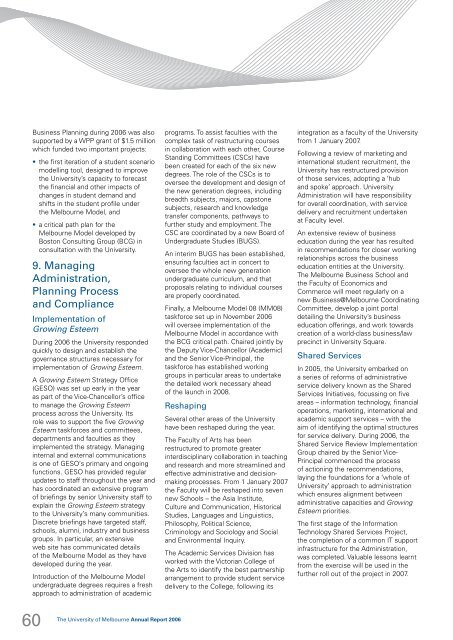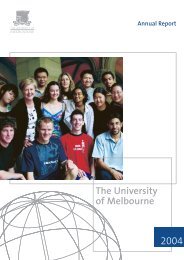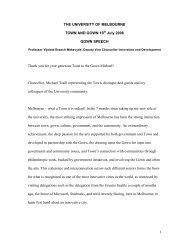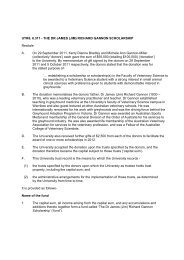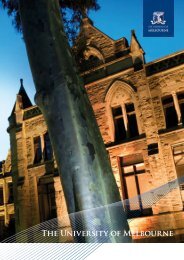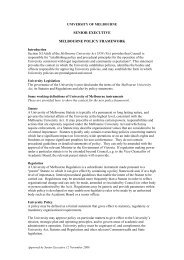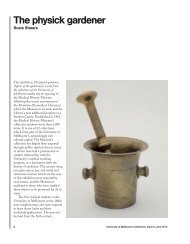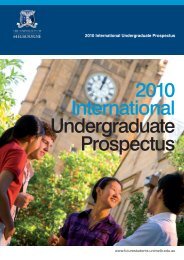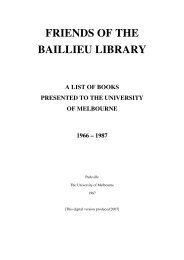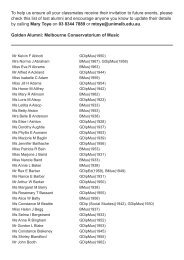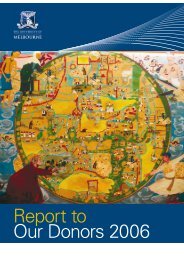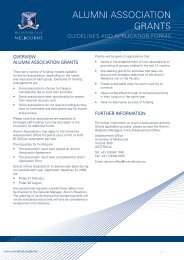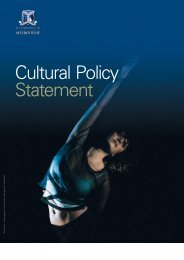annual report/2006 - University of Melbourne
annual report/2006 - University of Melbourne
annual report/2006 - University of Melbourne
Create successful ePaper yourself
Turn your PDF publications into a flip-book with our unique Google optimized e-Paper software.
Business Planning during <strong>2006</strong> was also<br />
supported by a WPP grant <strong>of</strong> $1.5 million<br />
which funded two important projects:<br />
• the first iteration <strong>of</strong> a student scenario<br />
modelling tool, designed to improve<br />
the <strong>University</strong>’s capacity to forecast<br />
the financial and other impacts <strong>of</strong><br />
changes in student demand and<br />
shifts in the student pr<strong>of</strong>ile under<br />
the <strong>Melbourne</strong> Model, and<br />
• a critical path plan for the<br />
<strong>Melbourne</strong> Model developed by<br />
Boston Consulting Group (BCG) in<br />
consultation with the <strong>University</strong>.<br />
9. Managing<br />
Administration,<br />
Planning Process<br />
and Compliance<br />
Implementation <strong>of</strong><br />
Growing Esteem<br />
During <strong>2006</strong> the <strong>University</strong> responded<br />
quickly to design and establish the<br />
governance structures necessary for<br />
implementation <strong>of</strong> Growing Esteem.<br />
A Growing Esteem Strategy Office<br />
(GESO) was set up early in the year<br />
as part <strong>of</strong> the Vice-Chancellor’s <strong>of</strong>fice<br />
to manage the Growing Esteem<br />
process across the <strong>University</strong>. Its<br />
role was to support the five Growing<br />
Esteem taskforces and committees,<br />
departments and faculties as they<br />
implemented the strategy. Managing<br />
internal and external communications<br />
is one <strong>of</strong> GESO’s primary and ongoing<br />
functions. GESO has provided regular<br />
updates to staff throughout the year and<br />
has coordinated an extensive program<br />
<strong>of</strong> briefings by senior <strong>University</strong> staff to<br />
explain the Growing Esteem strategy<br />
to the <strong>University</strong>’s many communities.<br />
Discrete briefings have targeted staff,<br />
schools, alumni, industry and business<br />
groups. In particular, an extensive<br />
web site has communicated details<br />
<strong>of</strong> the <strong>Melbourne</strong> Model as they have<br />
developed during the year.<br />
Introduction <strong>of</strong> the <strong>Melbourne</strong> Model<br />
undergraduate degrees requires a fresh<br />
approach to administration <strong>of</strong> academic<br />
programs. To assist faculties with the<br />
complex task <strong>of</strong> restructuring courses<br />
in collaboration with each other, Course<br />
Standing Committees (CSCs) have<br />
been created for each <strong>of</strong> the six new<br />
degrees. The role <strong>of</strong> the CSCs is to<br />
oversee the development and design <strong>of</strong><br />
the new generation degrees, including<br />
breadth subjects, majors, capstone<br />
subjects, research and knowledge<br />
transfer components, pathways to<br />
further study and employment. The<br />
CSC are coordinated by a new Board <strong>of</strong><br />
Undergraduate Studies (BUGS).<br />
An interim BUGS has been established,<br />
ensuring faculties act in concert to<br />
oversee the whole new generation<br />
undergraduate curriculum, and that<br />
proposals relating to individual courses<br />
are properly coordinated.<br />
Finally, a <strong>Melbourne</strong> Model 08 (MM08)<br />
taskforce set up in November <strong>2006</strong><br />
will oversee implementation <strong>of</strong> the<br />
<strong>Melbourne</strong> Model in accordance with<br />
the BCG critical path. Chaired jointly by<br />
the Deputy Vice-Chancellor (Academic)<br />
and the Senior Vice-Principal, the<br />
taskforce has established working<br />
groups in particular areas to undertake<br />
the detailed work necessary ahead<br />
<strong>of</strong> the launch in 2008.<br />
Reshaping<br />
Several other areas <strong>of</strong> the <strong>University</strong><br />
have been reshaped during the year.<br />
The Faculty <strong>of</strong> Arts has been<br />
restructured to promote greater<br />
interdisciplinary collaboration in teaching<br />
and research and more streamlined and<br />
effective administrative and decisionmaking<br />
processes. From 1 January 2007<br />
the Faculty will be reshaped into seven<br />
new Schools – the Asia Institute,<br />
Culture and Communication, Historical<br />
Studies, Languages and Linguistics,<br />
Philosophy, Political Science,<br />
Criminology and Sociology and Social<br />
and Environmental Inquiry.<br />
The Academic Services Division has<br />
worked with the Victorian College <strong>of</strong><br />
the Arts to identify the best partnership<br />
arrangement to provide student service<br />
delivery to the College, following its<br />
integration as a faculty <strong>of</strong> the <strong>University</strong><br />
from 1 January 2007.<br />
Following a review <strong>of</strong> marketing and<br />
international student recruitment, the<br />
<strong>University</strong> has restructured provision<br />
<strong>of</strong> those services, adopting a ‘hub<br />
and spoke’ approach. <strong>University</strong><br />
Administration will have responsibility<br />
for overall coordination, with service<br />
delivery and recruitment undertaken<br />
at Faculty level.<br />
An extensive review <strong>of</strong> business<br />
education during the year has resulted<br />
in recommendations for closer working<br />
relationships across the business<br />
education entities at the <strong>University</strong>.<br />
The <strong>Melbourne</strong> Business School and<br />
the Faculty <strong>of</strong> Economics and<br />
Commerce will meet regularly on a<br />
new Business@<strong>Melbourne</strong> Coordinating<br />
Committee, develop a joint portal<br />
detailing the <strong>University</strong>’s business<br />
education <strong>of</strong>ferings, and work towards<br />
creation <strong>of</strong> a world-class business/law<br />
precinct in <strong>University</strong> Square.<br />
Shared Services<br />
In 2005, the <strong>University</strong> embarked on<br />
a series <strong>of</strong> reforms <strong>of</strong> administrative<br />
service delivery known as the Shared<br />
Services Initiatives, focussing on five<br />
areas – information technology, financial<br />
operations, marketing, international and<br />
academic support services – with the<br />
aim <strong>of</strong> identifying the optimal structures<br />
for service delivery. During <strong>2006</strong>, the<br />
Shared Service Review Implementation<br />
Group chaired by the Senior Vice-<br />
Principal commenced the process<br />
<strong>of</strong> actioning the recommendations,<br />
laying the foundations for a ‘whole <strong>of</strong><br />
<strong>University</strong>’ approach to administration<br />
which ensures alignment between<br />
administrative capacities and Growing<br />
Esteem priorities.<br />
The first stage <strong>of</strong> the Information<br />
Technology Shared Services Project,<br />
the completion <strong>of</strong> a common IT support<br />
infrastructure for the Administration,<br />
was completed. Valuable lessons learnt<br />
from the exercise will be used in the<br />
further roll out <strong>of</strong> the project in 2007.<br />
60<br />
The <strong>University</strong> <strong>of</strong> <strong>Melbourne</strong> Annual Report <strong>2006</strong>


